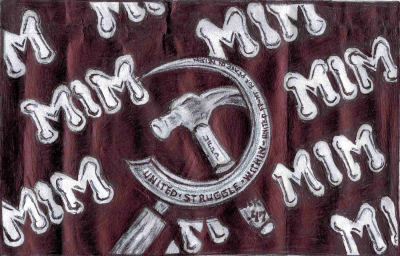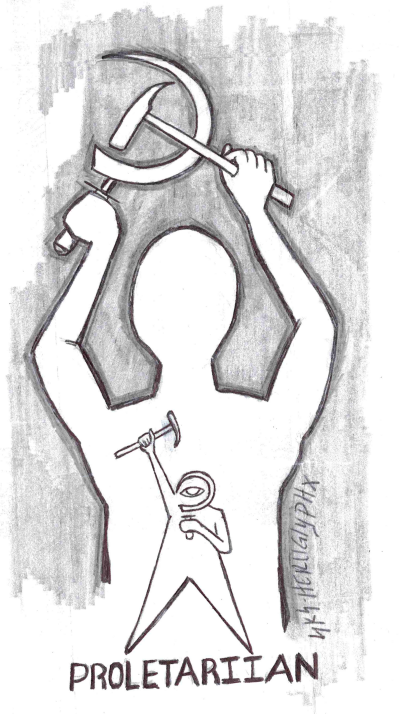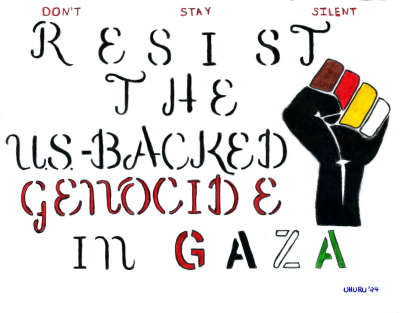The student movement for a free Palestine must correct the following
errors: capitulation, the First World obsession with “mutual aid”,
refusal to learn from history, blind fumbling in the interest of “doing
something”, hastiness to condemn (rather than critique) the struggle
here and abroad, surface level third-worldism as a justification for
inaction, and the fetish for determining who’s making “real communist
revolution” in place of a dialectical-materialist analysis of
history.
1: The Liberal Trend, The Capitulationists, The Refusal to
Stand IN OPPOSITION to Empire
The first trend I will critique consists of centering one’s own
pro-Palestine political action around things that in fact stop short of
anything that aids the fight for a free Palestine and an end to i$rael.
People following this trend do not fight for things such as divestment
from (or destruction of) weapons manufacturers or rejecting politicians
who support i$rael in words, policy, or money. Rather, these people and
groups focus on things such as organizing donations for individual
Palestinian families, securing scholarships for Palestinian refugees and
diaspora, or, in a more specific and truly condemnable example, the
schools who capitulated and abandoned their encampment for paltry
promises such as a house for Arab and Muslim students.
People rush to defend these forms of “resistance” with “we’re
centering Palestinian voices”, while not recognizing that none of the
things they’re fighting for (NGO-style refugee aid, more
Palestinian-diaspora petty-bourgeois in elite ideological institutions
of the amerikkkan state) are in any way actually opposed to the
amerikkkan empire or contribute in any way to a future in which
Palestine and its people are free from i$raeli and amerikkkan
aggression. We saw the protests in 2020 end in symbolic gains that were
not in any way contradictory to the U.$. empire, nor did they bring true
freedom from the brutality of kkkops in the ghetto. Today, this trend
threatens an unpleasant end for the currently-still-radical Palestinian
liberation movement – a ceasefire on i$rael’s terms, maybe two states,
more scholarships for the Palestinians who survived and were wealthy
enough to get to the United $tates, and everyone who was uncomfortable
chanting anything besides “ceasefire now” (the big brother of “defund
the police”) gets to feel good about “playing their part”.
In the past, people have been harsh on MIM(Prisons) for refusing to
capitulate to accepting any concessions for the First World that come at
the expense of the Third World, or even concessions that don’t
necessarily come at the expense of the Third World but serve to pacify
the First World. Most notably, this is expressed in how angry people get
about the analysis proving that prisoners, while no doubt an oppressed
class and a hotbed for potential for organizing, are not exploited, so
MIM(Prisons) doesn’t generally promote the fight for better wages for
prisoners. To self-criticize, even I myself originally was upset about
MIM(Prisons)’s stated intentions not to fight for healthcare for
transgender prisoners, interpreting this as latent transmisogyny rather
than a recognition that healthcare for trans prisoners (as important a
battle as I believe it to be) is not a struggle in the interest of the
global proletariat. Incidents like the capitulation of student
encampments at Northwestern University, Vassar College, and other elite
universities display clearly how radical a line that really is.
Going forward, two things are going to have to happen in order for
further protests for Palestine of this form to yield meaningful results:
first, protesters are going to have to recognize that everything they do
in protest should be in the actual, direct interest of the oppressed
people of Palestine, not in the interest of “anti-racism” or
“solidarity” or any bullshit half-measures. Second, protesters will have
to prepare to be faced with violence and with the full force of state
repression. Here’s a little logic-puzzle version of what happens when
you say “we’re staying here, we’re causing trouble, and we’re not moving
until you (divest/get rid of your dual degree program/get this
politician out of our town/whatever)”: there are three options. Option
one: you give in, you leave there, you stop causing trouble, you get
your House or your scholarships or your vote-in-six-months. Option two:
they give in, they accept your demands and nothing less. Option three:
they break out the tear gas, the riot batons, the robot dogs, the
big-ass battering-ram pigmobiles. And here’s the truth of it all: if you
let it be option one, you’re worthless, you’ve sold out the people of
Palestine. If you don’t let it be option one, if you make The Man choose
between option two and option three. Well, if he doesn’t have a really
good goddamn reason to choose option two, it’s gonna be option three.
That’s the unfortunate truth, so you better be ready, and start doing
wrist and shoulder stretches, because plastic flexicuffs hurt worse than
the metal ones, what’s up with that.
2. The Dogmatic Trend and its Flaws
What I just laid out describes the main current that I see “on the
ground” in so-called pro-Palestine “activism” that does nothing at all
for Palestine itself. I doubt I’m telling you guys anything new here,
besides confirming that such things are happening and making the
particulars clear. On the flip side of activism-theater, refusal to
study history, and “wins” for the First World, I also have noticed that
there is a trend to be unbelievably reductive and flippant when it comes
to what one’s orientation towards Third World liberation groups engaged
in armed struggle should be, what course of action should be taken in
the First World, and a refusal to engage in good-faith conversation
about either of those subjects without dogmatism.
I am speaking in particular about people who will say (correctly)
“fundraising and mutual aid and liberal-left protests don’t do anything
for Palestine”, but then follow that statement up with “the ONLY thing
that will ACTUALLY free Palestine is communist revolution”. Though the
last month has only strengthened my convictions that communism (in the
form laid out by Marx, Lenin, and Mao, and practiced in the USSR and
China) is correct, and true, and the only pathway to the permanent
liberation of all the oppressed peoples of the world, it seems
disgustingly chauvinistic to imply that the thing that a First-Worlder
can do that has the most material impact on the people of Palestine is
to focus on one’s home country, on some idea of “making revolution”.
Notably, other than MIM(Prisons) and another group I am working with
who I shall not name, I have noticed that people who say such things
don’t ever enjoy discussing what “making revolution” looks like, in this
day, in this country, beyond platitudes. I see this trend frequently
among communists who I know offline, but also among certain prominent
users of popular “anti-revisionist” communist online discussion boards
(I say this not to gossip or shit-talk, but rather because I believe it
behooves one to recognize that even spaces that portray themselves as
“anti-chauvinist” or “anti-revisionist” do not by default take Third
World liberation and the contradictions that it would entail seriously.
Judging by former discussions I’ve seen on the Maoist forums, this
warping of the idea of “revisionism” to defend inaction isn’t a new
trend per se).
This correct rejection of mutual aid and petit-bourgeois identity
politics, followed by the proclamation of the vulgar line of “nothing
you do has an impact for the people of Palestine if you aren’t making
communist revolution in your home country”, seems to me to be a
disguised version of the same sentiment that leads to disgusting and
chauvinistic lines such as “well, we should critically support Hamas,
but they aren’t communist, so the most important thing is to be critical
of them”. Did Torkil Lauesen believe that the most important thing that
a First-Worlder could do was “make revolution”, and that in the absence
of a clear path forward, one should sit on their heels and wait for one
to appear? did Ulrike Meinhoff? Would any of the people who say, whether
behind their screens or out on the streets or in the encampment, “the
only thing you can do for the people of Palestine is make communist
revolution”, genuinely try and claim that they’re doing more for
Palestinian liberation than Hamas, Lauesen, or Meinhoff? Of course I
don’t intend to advocate adventurism, I don’t believe that we in the
First World should be taking up the gun or robbing banks, but I do
believe that a refusal to engage with the question of what a liberated
Palestine (and, if Cuba and South Africa, for example, are any
precedent, not necessarily a communist Palestine) would look like beyond
First World radical academics’ ideas of “building revolution” is just a
flipside of the chauvinism displayed in the “well, at least we’re doing
SOMETHING” rhetoric of mutual aid and peaceful protest.
No matter whether they distort Marxism, Maoism, or third-worldism,
they inevitably find their way to the same conclusion: none of the
groups currently debating and fighting and sacrificing for the
Palestinian cause are worthy of my time; they’re all revisionist,
bourgeois, labor-aristocrats; students are all postmodernist
bourgeois-wannabes risking their educations and sometimes their lives
for the bit; protesters are all shills for the DNC; thank goodness I
don’t have to feel bad about my inaction. The dogmatists, the
“do-nothing”-ists, imply, in essence, the same thing that the first type
of chauvinists implicitly believe. The job of a First-Worlder is to
fundraise, or to go to art builds, or to read and daydream about the day
a revolution free of contradictions springs from the soil, while the job
of a Third-Worlder is to die.
3. Both Are Worse
As I’ve already said, my central point is thus: both trends, more
than anything else, serve as a justification for the ostensibly
class-conscious First-Worlder to not do anything that would compromise
their comfortable lives, a veritable “class-suicide hotline.”
“no, First Worlder, don’t go beyond liberalism and bourgeois
legality, don’t commit your valuable free time to reading and study,
don’t risk getting expelled – parade-type protests, symbolic
encampments, and mutual aid funds are totally sufficient and just as
important! You have so much to chant for, you have so many tech jobs to
land!”
“no, First-Worlder, don’t get involved, don’t join any groups, don’t
talk to the lower and deeper masses, don’t learn from resistance
movements of the past – you haven’t fought with enough other First
Worlders online or in your book clubs, god forbid you accidentally make
a mistake and learn from practice!”
These are the two trends that we must combat in the struggle for a
free Palestine here in the belly of the beast, where all the funding and
weapons for the ongoing genocide continue to flow from.











